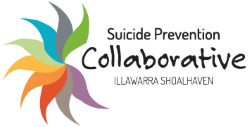The Illawarra Shoalhaven Suicide Prevention Collaborative officially launched the Black Dog Institute’s LifeSpan trial in the Illawarra Shoalhaven on Thursday 14 September.
LifeSpan is a new evidence-based, integrated approach to suicide prevention. It combines nine strategies that have strong evidence for suicide prevention into one community-led approach. Based on international estimates, LifeSpan has the potential to reduce suicide deaths by 20% and suicide attempts by 30%.
Dr Alex Hains, Regional Manager of the Collaborative, was delighted that the Illawarra Shoalhaven was selected as one of only four pilot sites in NSW for LifeSpan as suicide rates in the region remain higher than NSW averages, with latest data reporting more than 40 suicides in the region in 2014.
“LifeSpan is about working together to prevent suicide by implementing the strategies that work. Suicide prevention is everyone’s business, and so we want everyone in the community to understand what role they can play in reducing suicides, and to feel confident to play that role. The LifeSpan framework aims to better connect existing supports, and build evidence-based services that are targeted for our local needs,” said Dr Hains.
The Illawarra Shoalhaven Suicide Prevention Collaborative is coordinating the local implementation of LifeSpan, led and supported by the Black Dog Institute. The Collaborative, which was established in 2015, consists of representatives from more than 20 local community organisations, including the Local Health District, University of Wollongong, Illawarra Health and Medical Research Institute (IHMRI), Grand Pacific Health, Lifeline South Coast, COORDINARE – South Eastern NSW PHN, all four Local Councils, and all sectors of education.
“The Collaborative is well positioned to lead this work – all members have a shared ambition of reducing the impact of suicide in the Illawarra Shoalhaven by working collaboratively using the systems approach to suicide prevention,” Dr Hains said.
“We have already established five working groups, each focused on a specific area of suicide prevention including health, community and school interventions, restricting access to means, and Aboriginal and Torres Strait Islander suicide prevention.”
The working groups involve a range of services and sectors, as well as people with their own personal experiences of suicide and mental health recovery.
“The launch provided a great chance for the local community to find out more about what’s happening in suicide prevention in the region, speak with members of the Collaborative and find out how they too can get involved.”
“We all have a role to play in suicide prevention - it could be as simple as signing up to the Question, Persuade and Refer (QPR) training, a one-hour online course available from our website for just $10, which will help you recognise warning signs for suicide and help others in need,” said Dr Hains.
LifeSpan is being implemented in partnership with the NSW Ministry of Health, Commonwealth Primary Health Networks, NSW Mental Health Commission, NSW Department of Education and local community organisations. In developing the LifeSpan approach, the Black Dog Institute has been supported by a generous $14.7 million grant from the Paul Ramsay Foundation.
“LifeSpan aims to build and strengthen the local suicide prevention safety net, and empowers all sections of the community to take action using approaches that have been shown to have a real effect on suicide rates,” said LifeSpan Director Rachel Green from Black Dog Institute.
“Crucially, LifeSpan is Australia’s largest ever suicide prevention trial, giving us an unprecedented opportunity to see what works and help take the guesswork out of suicide prevention efforts.
“The trial will build capacity in the Illawarra Shoalhaven community by better connecting and coordinating existing services.”
The first LifeSpan trial site, Newcastle, was launched earlier this year, with the Central Coast and Murrumbidgee the next sites to commence after the Illawarra Shoalhaven region. Each local trial will run for an initial period of two-and-a-half years, with long-term sustainability built into every aspect of LifeSpan to provide a strong foundation for ongoing local community action and continuity.
The launch event also marked R U OK? Day.
Information about QPR training can be found at www.suicidepreventioncollaborative.org.au/QPR
Information about LifeSpan, including details of the nine strategies and the four trial locations, can be found at www.LifeSpan.org.au.
Photo credit: Hayley Warden, Kiama Independent
